The Third YMCA Peer School: Fostering Personal Growth, Communication and Career Guidance

Latest News The third YMCA Peer School: Fostering Personal Growth, Communication and Career Guidance Over the past three years, the YMCA Peer School has gradually developed as a space where young people learn to talk about topics that most often do not receive the attention they deserve within formal education. After one school year dedicated to mental health and another focused on peer violence, this year’s school combined the experiences from both previous years and focused on the questions that young people are increasingly asking – who we are, what drives us, and how to make informed choices for the future. Therefore, the focus was placed on personal development, values, and career guidance. The activities, led by Jovche Krsteski, youth worker and psychologist, were held in the first semester of the academic year at the premises of the youth center and included participants from seven high schools in Bitola. The Peer School was conducted through a series of workshops, organized into separate modules for personal growth and career development that build upon each other. The process began with exploring personal values, needs, and interests as a foundation for developing self-awareness. Participants reflected on what is important to them, what motivates them, and which factors influence their choices, as well as how these aspects affect their daily behavior and decision-making. Later, attention was directed toward the differences between knowledge and skills and their importance for personal and professional development, through which the young people recognized their own potential and learned that personal growth is not based solely on what we know, but also on how we apply that knowledge in various life situations. Communication and interpersonal relationships were identified as key components of personal development. Within these modules, participants explored communication styles, temperaments, and their impact on relationships with others. The work continued with topics related to conflicts, analyzing different strategies for resolving them and the connection between personal characteristics and reactions in conflict situations. In the later phase of the Peer School, the focus shifted to identity, personal vision, and long-term goals. Through creative and reflective activities, participants considered what defines them, which values guide them, and how these aspects relate to their future educational and career choices. The final modules were focused on taking initiative and preparing for peer education. Participants worked on planning and structuring presentations, adapting content for different groups of audiences, and developing confidence in public speaking. This part represented a transition from personal work to actively sharing the acquired knowledge within the school environment. The process was concluded with the awarding of certificates to participants who actively participated over the past months and carried out the planned peer activities. With this third Peer School, YMCA Bitola continues to build continuity in peer education and create a space where young people can develop, express themselves, and receive guidance and support in building their future. The project was supported by CVJM #SignsOfHope and the Municipality of Bitola! You can view the photos from the Peer School and peer education activities in the album below.
Communication Matters: Training and Knowledge Transfer in Three Schools in Bitola
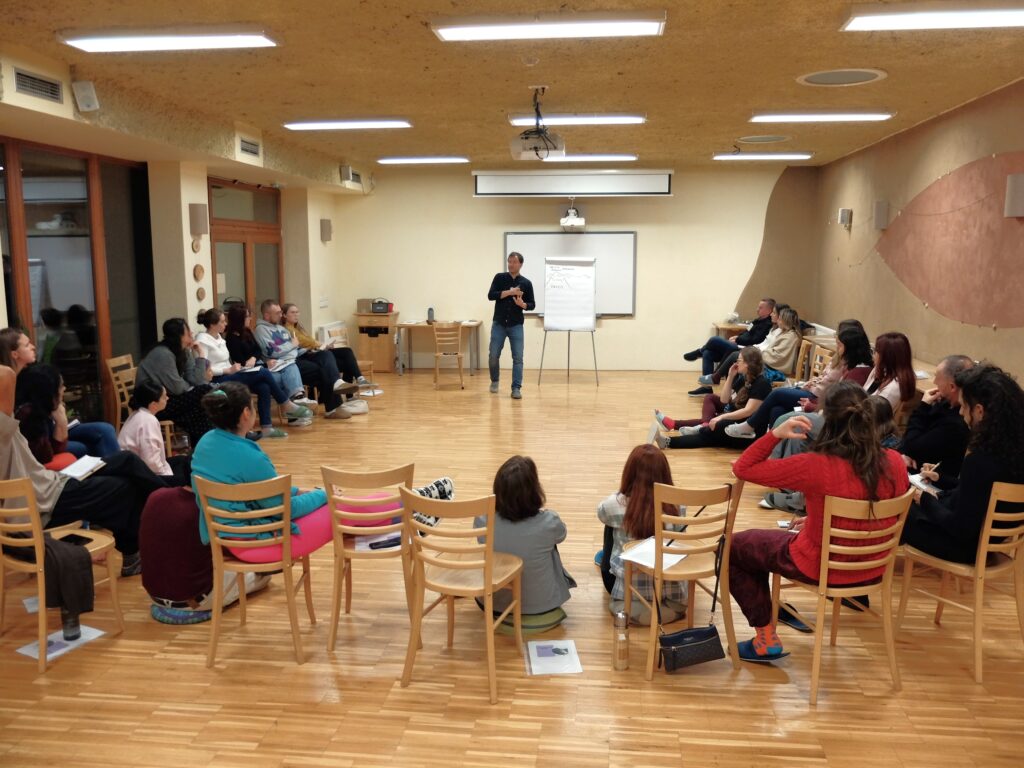
Latest News Communication Matters: Training and Knowledge Transfer in Three Schools in Bitola Our cooperation with schools is continuous and consistent. In addition to opportunities for educating children, we also offer opportunities for staff education. From 10 to 19 November 2025, representatives from the professional services of three schools in Bitola participated in Erasmus+ Communication Matters, an Erasmus+ training in Brno, Czech Republic, designed for educators, youth workers, and facilitators. The training focused on nonviolent communication, a method developed by Marshall Rosenberg, which aims to help distinguish people’s opinions from their needs and to foster understanding and connection even in situations of disagreement. During the training, participants engaged in theoretical sessions, group activities, interactive exercises, and simulations. They learned how to recognize subtle emotions and understand the needs behind different words and behaviors, how to listen empathetically, communicate clearly, and handle challenges and difficult situations. This process allowed them to see how the choice of words and the manner of communication influence relationships and the atmosphere within the group. Special emphasis was placed on applying these skills in work with young people, developing strategies for constructive conflict resolution, and building trust within the group. In December 2025, the participants shared the knowledge they had gained in three schools in Bitola – Dr. Trifun Panovski Primary School, Elpida Karamandi Primary School, and Goce Delchev Primary School. Students took part in interactive workshops, games, and group activities that allowed them to learn, in a practical way, the basics of empathetic listening, recognizing feelings and needs, and expressing their opinions clearly. The activities created a safe space where young people could practice communication, learn from each other, and explore different perspectives, while also strengthening cooperation within the group. The training and dissemination activities enhanced the participants’ ability to communicate attentively and with understanding, recognize needs, and support young people in creating a more open and safe environment. The application of the acquired skills at the local level confirms YMCA Macedonia’s commitment to building an empathetic, attentive, and supportive space for young people, fostering their development and active participation in the community. This project is co-financed by the European Union. You can view the photos from the training in Brno and the dissemination activities in Bitola in the album below.
We hosted the West Balkans Initiative 2025
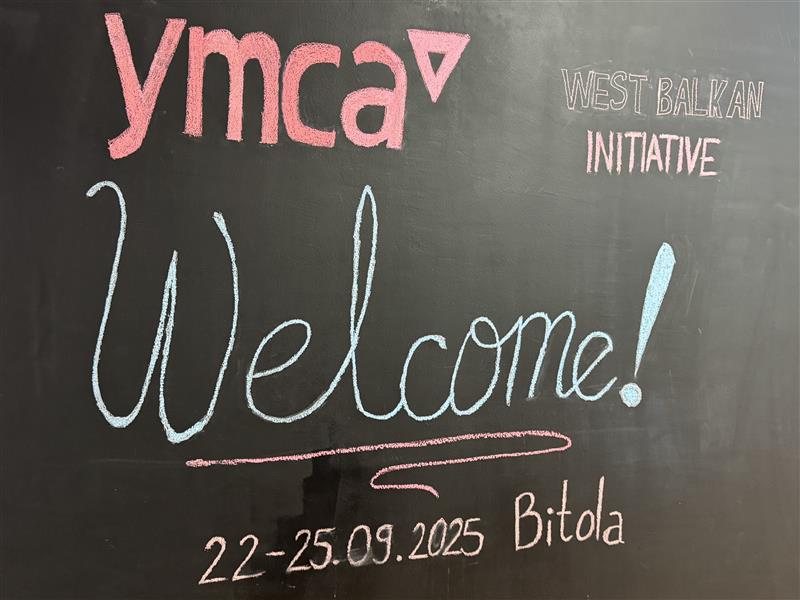
Latest News We hosted the West Balkans Initiative 2025 From September 22 to 25, 2025, YMCA.mk had the honor of hosting this year’s YMCA West Balkans Initiative Coordination Meeting. This event unites the energy, knowledge and vision of leaders from across the region and beyond. The gathering brought together representatives from the YMCAs from Macedonia, Serbia, Kosovo, Greece, Bulgaria, Italy, Albania, as well as representatives from our partners from the YMCAs of Germany and the USA. In addition, it was a special honor and a testament to the importance of this initiative for the development of the YMCA network in the region to have the Secretary Generals from World YMCA, Carlos Sanvee and YMCA Europe, Juan Simoes Iglesias as special guests. Shared Vision and Collaboration The regional meeting focused on strengthening local and national YMCA organizations through: The exchange of good practices in youth work Deepening collaboration among countries in the region Developing a strategic plan through 2030, in alignment with the global #YMCAVision2030 Training and discussions on responsible governance, financial transparency, and sustainable funding of youth programs. These themes lie at the heart of the global YMCA mission—an organization with more than 180 years of history dedicated to the holistic development of young people and the building of stronger communities. Learning, Sharing, Growing Through lectures, workshops, and discussions, participants had the opportunity to learn about contemporary challenges facing young people, to hear inspiring experiences from the USA, Germany, Italy, Greece, and the wider region, and to contribute to the creation of a joint framework for the future development of YMCA in the Western Balkans. Special attention was given to topics such as leadership, camping as a tool for non-formal education, and cultural exchange to build bridges of peace, understanding, and opportunity for youth. Adriana Stanovici and Scott T. Jackson from YMCA of the USA led an inspiring workshop on the magic of camps. Claudia Kuhn from YMCA Germany who consistently supports the Western Balkans Initiative in its growth journey led a session on capacity building, bringing the positive practices from Germany. In addition, we had sessions on the latest positive stories from Greece and Italy. Gratitude and Recognition Behind every successful event stands a dedicated team and volunteers, without whom none of this would be possible. Special thanks go to the YMCA.mk team and volunteers: Emilija, Jovan, Nikola, Antonio, Mila, Manuela, Jovana, Stefanija, and Miki, for their enthusiasm, support, and hospitality. As part of the global YMCA family, our YMCA proudly contributes to building a more peaceful, connected, and stronger Western Balkans with young people at the heart of every change.
Internship Opportunities at the YMCA: Supporting Young Professionals in Their Growth
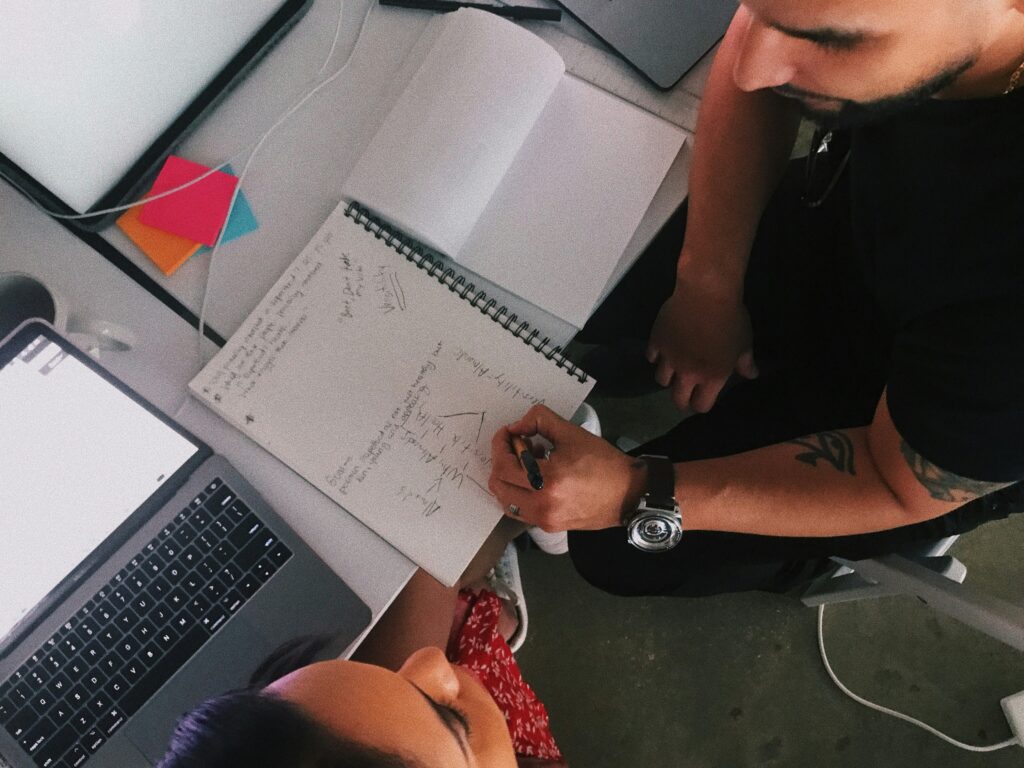
Latest News Internship Opportunities at the YMCA: Supporting Young Professionals in Their Growth Leona I have benefited from the internship in several ways. It has given me the opportunity to apply my academic knowledge in a real-world setting, allowing me to gain hands-on experience in graphic design. Working on diverse projects has helped me develop my creative skills, improve my design process, and become more confident in my abilities. Additionally, the internship has taught me how to work effectively within a team, collaborate with others, and meet deadlines, which are all valuable skills for my future career. It has also provided me with a better understanding of the professional environment and the importance of communication and feedback in achieving quality results. Overall, this experience has significantly contributed to my personal and professional growth. Fidela My name is Fidela and I am a master’s student. During my studies, I had the opportunity to become part of the YMCA as an intern. I would like to share that during my internship in the organization I gained skills and knowledge that contributed greatly to me as a student, as well as to my professional development. Additionally, I would like to highlight my positive experience working with my mentor, as his support and cooperation significantly contributed to the successful completion of my tasks.
YMCA World Accelerator Summit: Vision 2030 in Mombasa, Kenya
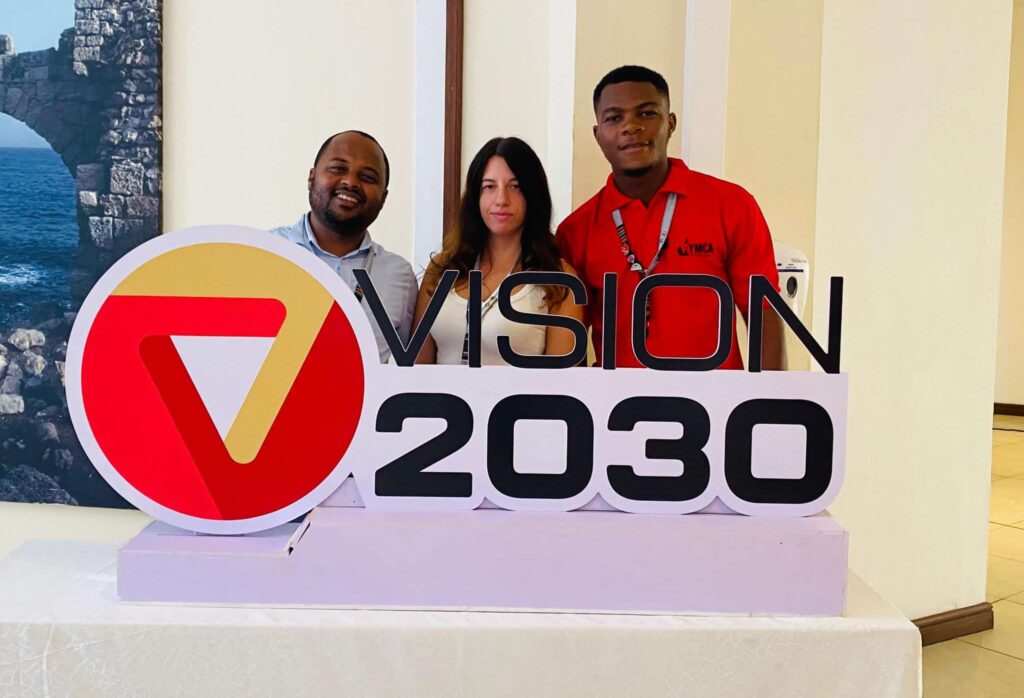
From 21st to 26th October 2024, I had the incredible privilege of attending the YMCA World Accelerator Summit in Mombasa, Kenya.
The Strategic Meeting of the YMCA Western Balkans
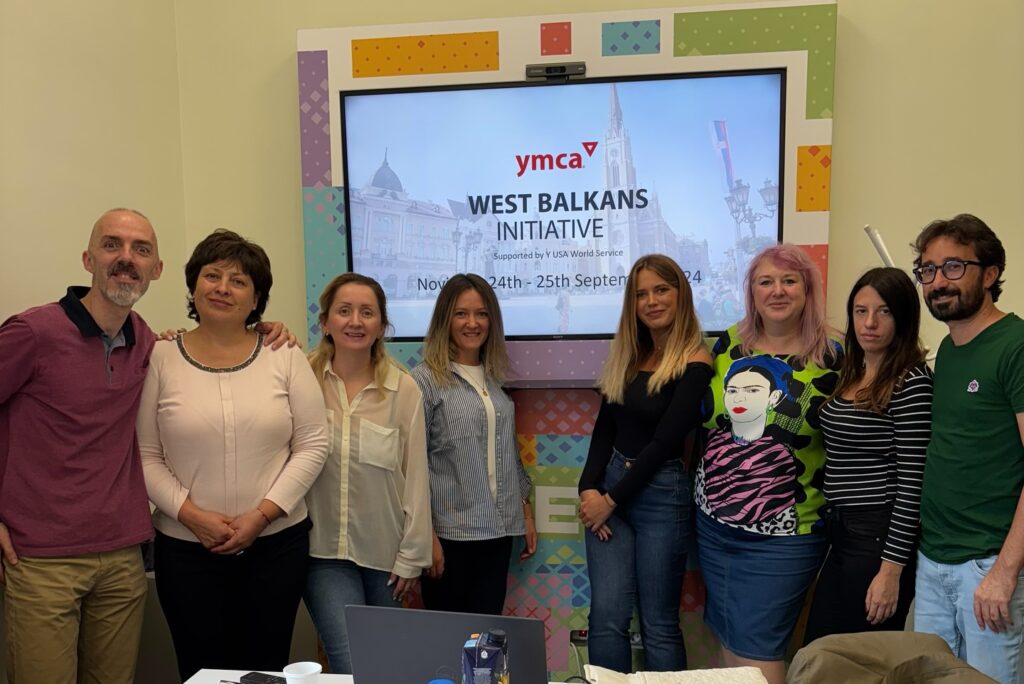
Latest News The Strategic Meeting of the YMCA Western Balkans From September 23rd to 26th, we had the opportunity to attend the meeting of the Western Balkans Initiative (WBI). This initiative is supported by YMCA Europe, The YMCA of the USA and YMCA Germany to the YMCAs in Kosovo, Macedonia, Albania and Serbia. The meeting, organized by YMCA Serbia in Novi Sad, focused on sustainability, with a relevant agenda that covered the following main topics: Showcase of YMCA Serbia programs and development Progress report for 2023: Serbia, Macedonia and Kosovo Current work plan for the YMCA region (measuring impact) Review of success stories and challenges from Bulgaria, Italy, Romania and Kosovo in property management Best practices from YMCA Germany running hostels Comprehensive fundraising for capital investments EU and Erasmus+ funding opportunities The meeting is a follow-up on the previous West Balkans meetings in extended format with guests from YMCAs from Bulgaria, Romania and Italy. Hybrid sessions were attended by representatives of YMCA USA and YMCA Germany. This partnership highlights the importance of shared goals and collaboration between YMCAs, regardless of location, in fostering impactful work across Europe. The progress of the WBI Action Plan 2023-2025, created to enable the appropriate growth of YMCAs from the Western Balkans, was presented. The action plan aims to improve the situation in 3 key areas: youth programs (improve program quality, reach more young people), good governance (improve governance, structures, transparency, financial discipline and establish good conduct policies) and self-sustainability (build meaningful partnerships, income generation programs, fundraising strategies and secure capital investments as a strategic goal for sustainability). This event was a great opportunity to bring together colleagues from different YMCAs to share, learn from each other, dream, be inspired, ask tough questions, share challenges and together build bridges of hope, cooperation and fellowship. A big thank you to YMCA Serbia for the incredible hospitality in the beautiful city of Novi Sad! Photos from this Activity in this gallery.
Igniting our Mission in the West Balkans Initiative
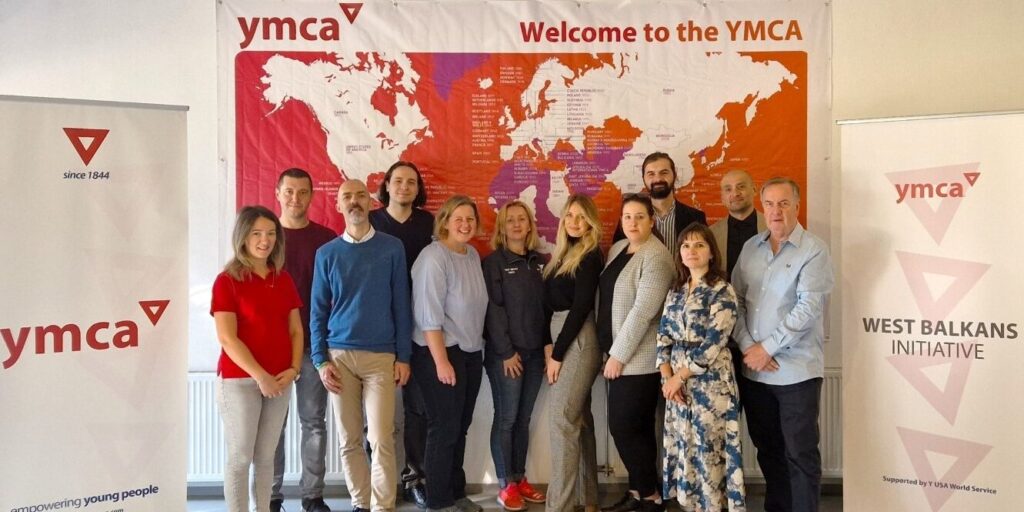
From the 13th-16th of October, our representatives have been present at the West Balkan Initiative meeting, hosted by YMCA Kosovo. The program sessions were designed around the integration of the mission, and vision of the participating YMCAs from N.Macedonia, Albania, Kosovo and Serbia – and the establishment of a bright and flourishing future together within our movement. Besides the representatives of the West Balkan Initiative, the meeting had several YMCA guests who gave their contributions to the program such as Claudia Kuhn from CVJM (YMCA Germany) with inputs on the Program Development, Paul Smillie from the YMCA Europe Movement Strengthening Initiative with inputs on Governance Improvement, Marius Pop from YMCA Europe Strategic Partnerships with inputs of the collaborations with the corporate sector, Tom Valentine from YMCA of the USA with inputs of the perspectives and support for the region in future and Andy from YMCA Europe Communications Team. The program offered an incredible opportunity to exchange good practices, meet the local youth leaders, and visit YMCA centers across the country including the new Camp Pjetershan. Our stay was in the city of Peja with sessions and lunches held at the local YMCA – an impressive multi-functional facility that accommodates a variety of training programs and youth-oriented sessions. It has been a great opportunity to provide an update on each movement on their development during the initiative and plans in light of the promising partnerships and potential future activities. It has been a great time to remember all the values, memories, and experiences that brought together the leadership of the West Balkans Initiative – continuing to focus their work on regional plans, future steps, challenges, and opportunities for the upcoming year. In terms of achievements, it is worth mentioning that new municipality spaces and agreements have been acquired by some YMCAs, each YMCAs revenue has increased throughout the initiative, new partnership projects (within the region and Internationally have begun), extra focus on not just the leaders but staff and board members has been given. With over 20 digital meetings (team and 1 to 1) plus study visits to all participating YMCAs this year the region is slowly growing and heading in the right direction- with still much work to be done. And the crown jewel of our trip – Camp Pjetershan – an impressive YMCA camp accommodating 70 young people and offering wonderful facilities like sports and training facilities, camp halls and offices, camp dorms, campfire site- a space that can be used for multiple outdoor-oriented activities and a fine example of local, national and international support for a project. We have been inspired by this meeting, awed by the resilience and determination of the team, and the individual work of every participating YMCA that is creating change in their communities – and we are grateful to be part of it.
Participants’ Impressions from the YMCA+HP Digital Education Program
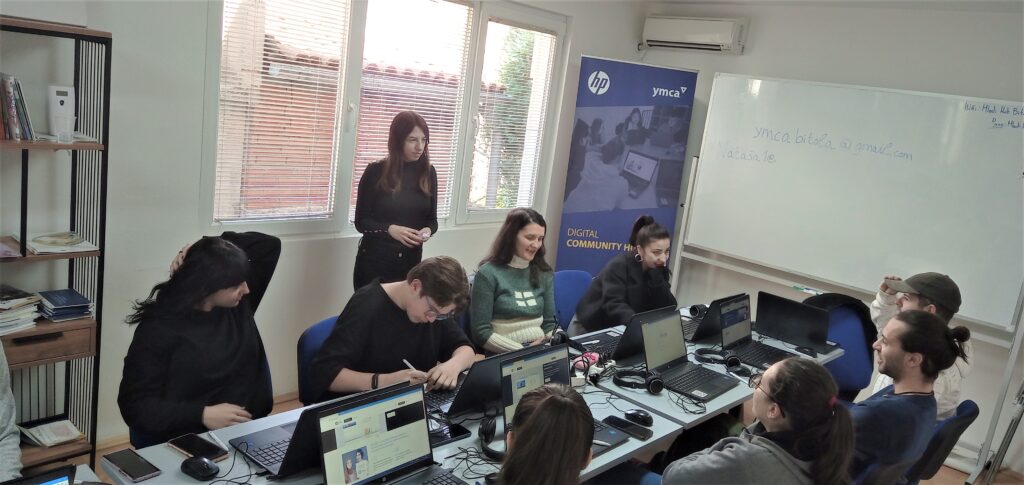
Martha I am Marta from Krushevo, I am currently studying in Bitola. I found out about the courses through Natasha from the YMCA because we know each other from before. Today I attended the fifth course and in the future, I plan to attend several more courses. The courses are interesting to follow, and the atmosphere in the Youth Center is harmonious and pleasant. I plan to use the courses that I have followed so far and the experience I have gained from them for my career and development. Antim I am Antim Atanasoski, 18 years old from Bitola. I feel honored to participate in four courses made by HP and implemented in cooperation with the YMCA. One of the courses that I liked the most was Social Entrepreneurship, which was very practical and informative, unlike other courses of this type that I have visited online. What you learn from the course can be used practically every day of your life. Of course, I plan to visit other courses in the future, because there is a lot to learn from each course. Ljupco First I want to say that digital education is not just about new skills, it is most important to think about growth and embrace quality improvement. I am Ljupco from Bitola, I found out about the courses through the YMCA where I am a volunteer and have participated in many events and workshops organized by them. I just saw the application on social networks and immediately signed up without thinking if it would be interesting or if it would be useful to me, and to be honest I did not make a mistake! I attended five different courses in the categories of communications and marketing, as the most suitable subjects for me. I believe that every young person should study these courses, which will be very useful in life, in everyday life and the job search. I am currently working abroad, but after my return to Bitola, I will apply again for the courses, especially for the topics of innovation. YMCA and HP thank you for this opportunity you have given me, see you again soon! Elena Being employed and being a parent at the same time is much more difficult than it seems, I am Elena Ivanov, 28 years old, from Bitola. I have been in the YMCA for several years with short breaks. My job position is office manager. In the past years, we worked on non-formal education and organized summer camps, but after the great pandemic that happened, I can say that the HP courses are the best thing that happened at the YMCA. In addition to my daily duties, I still had the opportunity to take several courses on the subject of communications, which is what attracts me the most and I would like to share with you that the Business e-mail and Business Communication courses are courses you must attend. The courses are not long, the maximum time you will need is 1 hour. I would be very happy if you decide to attend these courses of the HP life program and of course, I want to thank HP and the YMCA for this great opportunity of free courses in our city. Philip Hello, my name is Filip Bozinovski and I am 17 years old. I want to say that I have completed all the courses of the HP Life project and I can say that I am quite satisfied. I learned about the HP Life courses from my high school “Josip Broz-Tito” from Bitola. Through these courses, I have acquired quite useful and good skills that I find myself in in the future. I desire to further study at a university whose task is to acquaint us with skills that use technology and help humanity. The courses are easy, short, entirely online, and above all, free. I would personally recommend these courses to all my friends and acquaintances as a starting point for acquiring useful computer skills that can help everyone, especially young people who are interested in starting their own business or upgrading their computer skills. Now, I have finished my last course, and as my favorites, I can single out the communication courses, as well as the Success Mindset course. I thank the YMCA as well as the HP because they provide conditions for a quick way of learning useful skills. Jana From my experience so far, I only know that digital education opens up a world of possibilities for me. My name is Jana, I live and study in France. I have a very busy schedule and I am very happy that I am in the right place at the moment where I have access to high-quality courses that help me to keep up with the latest trends in my 3D printing industry, all thanks to YMCA and HP courses. I had the opportunity to choose whether I wanted to listen to the course in English or French. I chose French, which is really of great importance to me. The courses are easy to understand, they are not long and the most important thing is that I also received a certificate for completing the course, and all for free! Guys, I hope that you will manage to find at least one hour a week and dedicate it only for you and you will improve yourself above all as individuals. YMCA and HP, thank you for the opportunity you gave me, see you again that is for sure! Read here to learn more about this project
Roots Peace Work Institute Reunion in The Holy Land
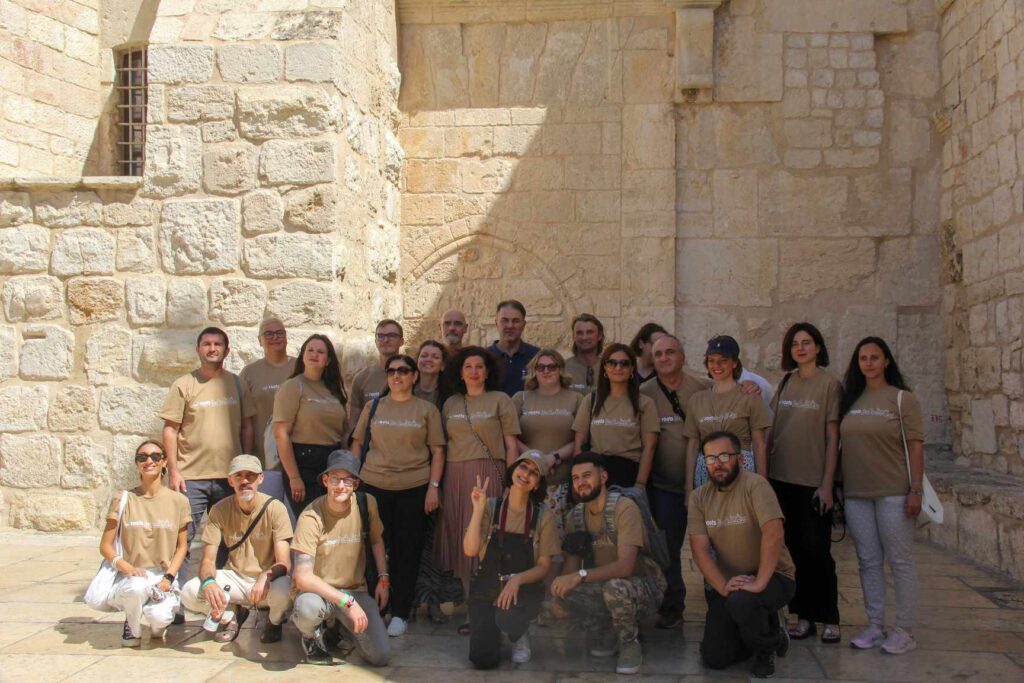
By Viktor Iliev It’s been quite a while since my last participation in some of the Peace Work Institute sessions. As a 2015-year alumnus, I was invited to join this event to reflect on the previous period in terms of tools, methods and experiences. The venue for the event was the Holy Land which also provided additional learning context. Of course, I accepted the invitation and attended the event. 28 participants, more than 10 countries, 3 different cohorts and 1 week together. It was a privilege to work with Peace Education experts such as Wolfgang Heinrich & Ankica Dragan who have been involved in this program from the very beginning providing the know-how. This time it was the Roots Context Analysis with a particular focus on the impact and relevance of Peace Work Institute Scheme and run through the prism of Reunion participants. We have been blessed being welcomed and hosted with exceptional hospitality and care in each day and place by our friends from Bethlehem, Jericho and Jerusalem, representing both the East Jerusalem and Jerusalem International YMCAs. With not much positive narrative in the media for this region, I felt inspired to see and hear what the YMCA does for its beneficiaries in a very challenging context – generating skills, opportunities and hope for the entire community for almost a century. And all of it despite a wide range of limitations and restrictions – because the people in the YMCA believe in what they do. Maybe the best part of this event was meeting local people and hearing their stories. In many aspects I feel shocked and empathized with the challenges, conditions and lifestyle of the Palestinian people finding some common realities and history with our local people in my homeland. I felt grateful to be able to hear the stories of the other side of the coin. I feel privileged to attend the site visits: Bethlehem, Jericho, and Jerusalem, Nativity Church, River Jordan, Mount of Temptation, Al Aqsa Mosque, Holy Sepulchre Church and a myriad of sacred places. Following the footsteps of Jesus Christ and reflecting upon his life, journey, and sacrifice. Deeply humbling and impactful – giving so much meaning and motivation for what we do and how we live.
Тraining in Plovdiv on NLP: Unlocking the Potential of the Mind
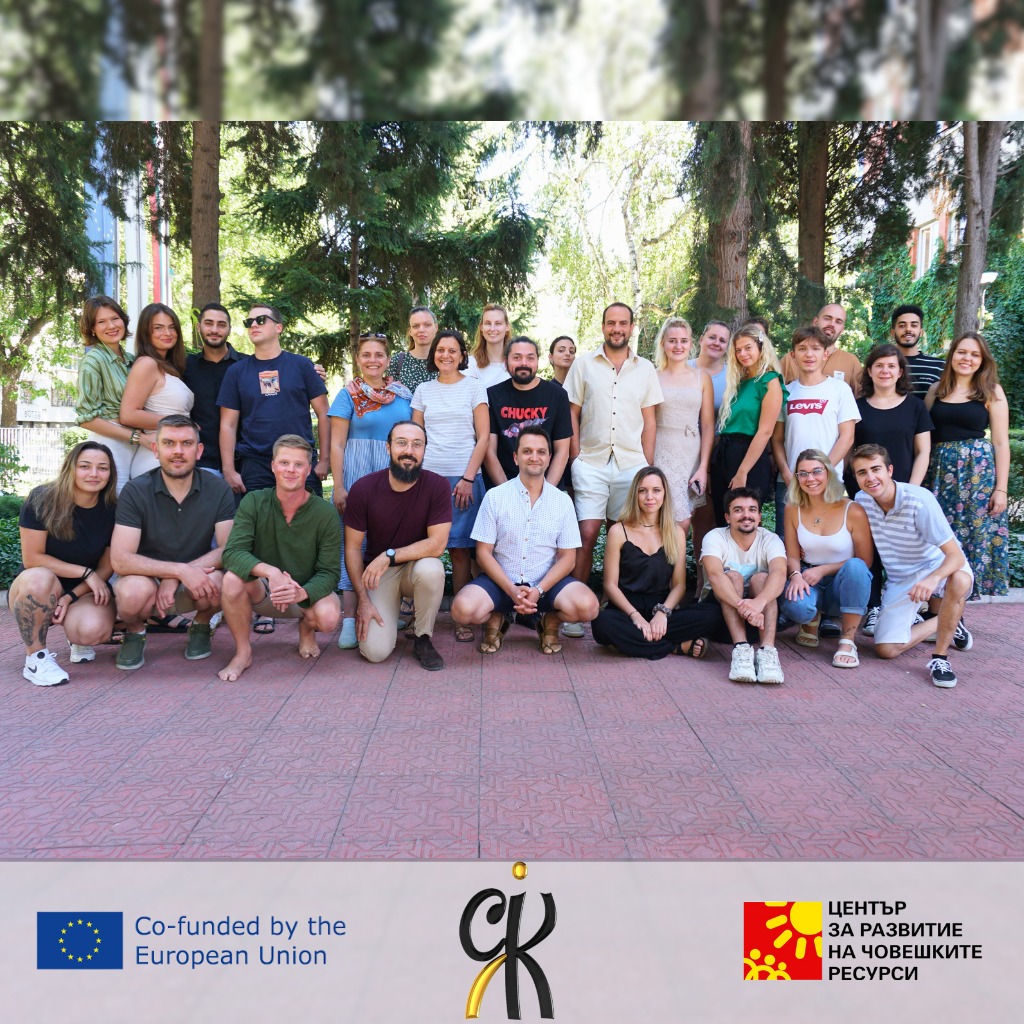
By Jove Krsteski It is known that Neuro-Linguistic Programming (NLP) is a methodology that investigates the dynamic relationship between language, neurological processes, and behavioral patterns. It is a versatile approach that offers understanding of human behavior, communication, and personal development and also practical techniques for enhancing personal growth, improving communication, and bringing positive change by understanding connections between thought patterns, language use, and the subjective experience of the person. From 31 August to 10 September 2023 in PLovdiv, Bulgaria was held a training course named “NLP – New Language Practice” that was based on Neuro-Linguistic Programming exercises. It was organized by Kibela Association in cooperation with Smokinya Foundation and Human Resources Development Center from Bulgaria, and was co-funded by the European Union. In this training there were participants from Bulgaria, Spain, Serbia, Poland, Macedonia, Latvia, Italy, Hungary, Greece, France, Estonia and Czechia. If we recapitulate what we got from this training, we can say that much of the basics in the NLP theory practice was broadly elaborated, and we had a lot more time to work with the practical exercises that were given to us. Speaking more concretely, in the theoretical part, we went through the basic meta-model of NLP (as explained by Bandler and Grinder, 1975) and then we elaborated it more with the “third generation model” of interlinking between physiological cues, language and cognitive characteristics. We had a chance to briefly familiarize ourselves with the 5 “R” in a setting (the Resources we have and use as an input in the ‘situation’, then the Roles that are played, the Relationships that are happening, the Rules that need to be followed in order this to be a proper ‘situation’ and at the end, as output the Results). In this manner, certain roles we need to know are the ones that are part of the learning trio of ABC, where “A” is talking/sharing, “B” is learning/listening and “C” is observing/observer. Once a ‘setting’ is established, the main philosophy of everything is that whatever we observe, our interpretation of it is something different (this is also elaborated as the ‘event’ vs. ‘story’ difference in any given situation). This was brought to us alongside the main NLP idea that the “map is not the territory”. The most interesting input here was the fact that “the most flexible part of any system is usually the part that controls it”. Calibration of our input/output was also mentioned, calibration of what we bring to a situation as well as what we take, or recieve. This was recapitulated after a few days as points of observation that the theory gives (see flipchart). The representational systems of the personality were also elaborated (the Visual, Auditory, Kinestetic were mentioned in “NLP Volume 1” from Dilts, Binder, Grinder and DeLoiter from 1980, but also the Digital was included later in the training.) The eye accessing cues viewpoint was also mentioned. From the more psychological standpoint was the schema presented of how unconscious/ unconscious can be seen in relation to what competency and incompetence are, and alongside with this, the “presuppositions” were elaborated regarding the information that is implicit in a communication that is happening in a setting. Next part of the training was exploration of what the proper attitude of a coach should be, as well as the competences he has to have (see flipcharts), around which a discussion was held. After that, the training offered us a lot of space to practice. We formed trios and had a chance to see and later on experiment with several practical tools. Several conversational techniques were offered for practice (backtracking, lazy coach, reflection on feeling, shooting from the hip) that are used during dialog and help facilitate certain objectivity. Then, we familiarised ourselves with the “hoponopono technique”. Also, we had a specific instructor that gave the opportunity for us to practice our voice, tone and verbal expressions. With this, the whole VAK representation in the participants was satisfied, since we used a lot of schematics in flipcharts for explanation – for the Visuals, this with voice training – for Auditory, and the whole set of dedicated space and time for practice was – for the Kinestetics/ Digital ones. And of course, the more typical practicalities for NLP were also present; the rapport, the anchoring and the reframing approaches. It was also explained how we can use a timeline as a technique for elaborating on personal issues, and also one of the participants offered technique for working with our personal limiting beliefs. Neuro-Linguistic Programming offers a treasure trove of practices and techniques for enhancing communication, managing emotions, and transforming one’s perspective on life. Many of the NLP practices empower individuals to connect more deeply with others, take charge of their emotional responses, and break free from limiting beliefs. By incorporating these practices into their lives, individuals can embark on a journey of personal growth, self-discovery, and improved relationships, ultimately unleashing their full potential. This is true and useful in a psycho-therapeutic context, but also in the field of youthwork. Many of the techniques can be modified to serve as tools for empowering youth workers. It certainly helped me to learn more and become more aware of the usefulness of the conversational techniques and the benefit they have regarding the mutual working context between youthworkers and young people, especially if we have in mind that young age is the age of personal development. All techniques that bring more clarification INTO CONVERSATION are of benefit. But also, this training brought together so many participants from different ages and life experiences, a mix that was so beneficial and added more to the group learning experience we all had. I felt satisfied at the end and enjoyed this learning experience, which helped me to see how useful all of these techniques can be for working with young people.